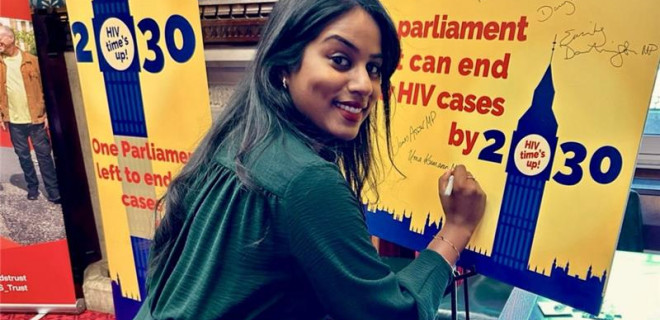Thursday 1 December is World AIDS Day, a time to remember those we have lost, and how far we have come since the early days of the epidemic.
This year marks 40 year since the death of Terry Higgins, one of the first to die of AIDS-related illnesses in the UK. He is one of so many whose lives were cut short, who we stop to remember on World AIDS Day. It was the people who loved Terry who founded our charity, at a time when there wasn’t even a name for the virus he had, let alone a test or any treatment.
When Terry died, his partner Rupert wasn’t told what anything about the cause because their love was not recognised or respected. He had to read about Terry’s case in a medical journal.
That was the context in which Terrence Higgins Trust was founded.
I was diagnosed 15 years later in 1996. By then, HIV had a name and we had a test, but that wasn’t much comfort when my clinic told me I had a maximum of eight more years to live. I was expected to die in my thirties – like Terry did.
What I wasn’t told that day was that my clinician had just come back from the 1996 AIDS Conference in Vancouver. The theme was ‘One World One Hope’. There had been a breakthrough that year and at the conference, researchers presented on Anti-Retroviral Therapy.
I was diagnosed on the cusp of this change, so although I didn’t know it at the time, I was going to be able to live long beyond my thirties - albeit with the grim side effects of that early triple therapy.
Fast forward another 26 years and now the UK is working to become the first country in the world to end new cases of HIV by 2030. This really would have been unthinkable back in the 1980s.
Quote textTackling stigma needs to be a priority on World AIDS Day, and every day.

On World AIDS Day, it’s vital that we celebrate the tremendous progress we’ve made around HIV. Today a diagnosis is not a death sentence as it was in the 1980s. People living with HIV who are on effective treatment can’t pass on the virus to others and can expect to live a normal and fulfilling life. There’s a medication now called PrEP (pre-exposure prophylaxis) that protects people against HIV.
We’ve made remarkable steps forward that Terry could never have dreamed of – but stigma continues to be a huge issue for people living with HIV. We experience it every time someone cruelly rejects us on a dating app, when someone in healthcare takes extra precautions while taking our blood and when we hear a joke where HIV is the punchline.
Polling we’ve released to mark World AIDS Day has revealed alarming levels of stigma people living with the virus – with nearly three quarters of those surveyed (74%) reporting they’ve experienced it due to their HIV status.
There is a clear disconnect between the advancements we’ve made around HIV and the public’s knowledge of HIV. Outdated beliefs on the virus are continuing to fuel stigma, because if people knew the truth about HIV, they’d know there’s no reason to discriminate against anyone living with the virus.
Tackling stigma needs to be a priority on World AIDS Day, and every day. Play your part by challenging misconceptions about HIV and telling as many people as possible about the reality of the virus in 2022.
Together we can be the generation that ends the HIV epidemic and eradicate the stigma associated with the virus for good. Donate today to support our vital work.
Ian Green is Chief Executive of Terrence Higgins Trust.



